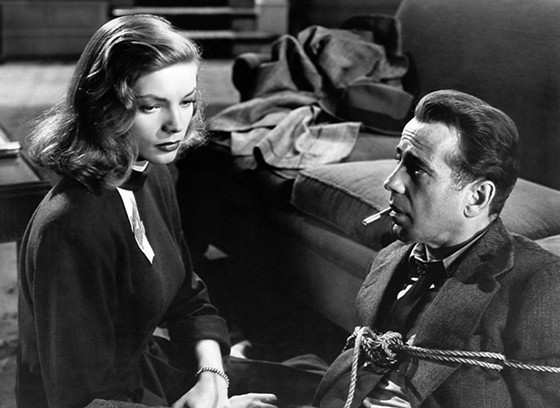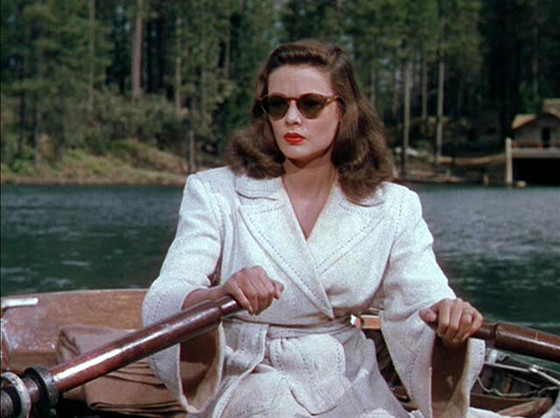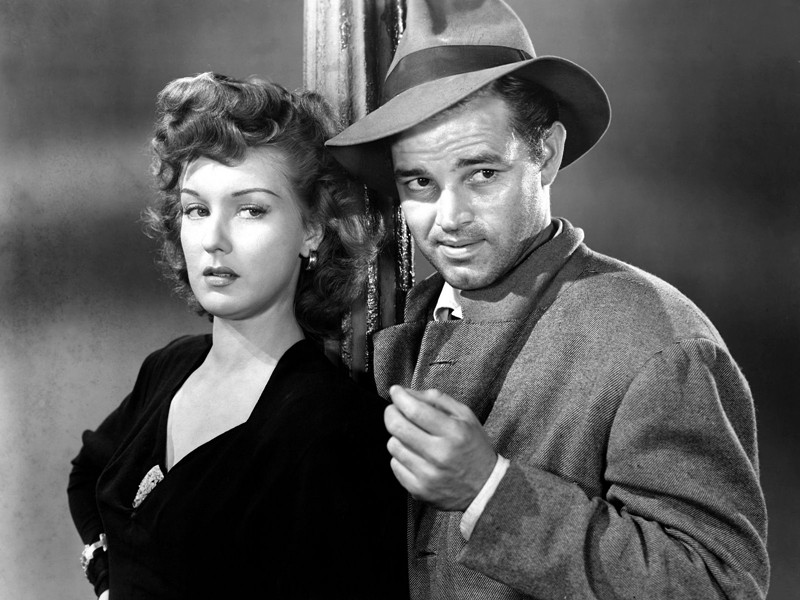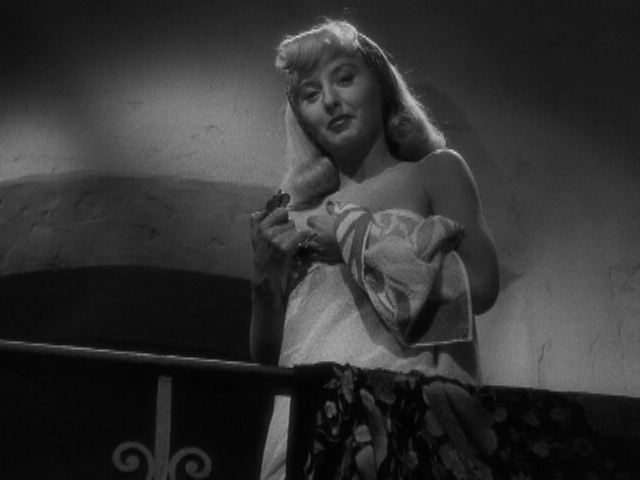5. The Big Sleep (1946)

Big Sleep is based upon a Raymond Chandler novel (alike many other crime movies at the time) and directed by Howard Hawks. Not only it is a definitive piece of noirs, but it also presents two femme fatales at once, sisters Carmen Sternwood (Martha Vickers) and Vivianne Sternwood Rutledge (Lauren Bacall).
They are both rich, beautiful and more or less involved in acts of crime but they are not quite the same in their character and behaviour. “One is wonderful and the other is not so wonderful” as is said in the movie.
Carmen is a young, inmature, and wild girl who is let to do whatever she wants and most of the time she seems to act silly out of sheer boredom. She throws herself into men’s arms but thumb-sucking like a baby at the same time – she is somewhat a Lolita figure, however older. She stirs up things around her and causes trouble, mainly to her own aging father stuck in a wheel chair and to her sister.
Vivianne is much smarter than Carmen. She seems to always see the big picture; at least she somehow always shows up everywhere just before Marlowe (Humphrey Bogart). She is quite reckless and cold at first but as the two start to develop romantic feelings for each other, both of them change their attitude in the course of events.
Lauren Bacall is great in this role, using a lot of that well-known trademark look and they have quite a few well-written lines too with Marlowe.
4. Leave Her to Heaven (1945)

Ellen Berent (Gene Tierney) could be the non plus ultra of obsessed married femme fatales, she goes way beyond any imagination from the first moment we meet her by actually wooing and proposing her husband-to-be. All this, in just a couple of days after they met accidentally on a train. She then tries her best to keep anyone – and by anyone we mean men and women alike – away from her sweetheart so she could have him only for herself.
Her husband, the writer Richard (Cornel Wilde) is a real floater by his own confession and this makes him the perfect catch for her, together with his close resemblance to her lately deceased father whom she loved with great admiration.
Ellen certainly does not show great respect for women, she almost completely ignores her mother and only notices her step sister when she becomes a potential threat to her marriage. However, she is also jealous of men who appear around Richard.
Inevitably, her obsession leads to her final destruction, where, quite impressively, she also tries to control the events even after her death. It’s open to our interpretation whether she failed or not…
3. Detour (1945)

Detour is a dark, pessimistic noir movie and Vera (Ann Savage) is probably the most aggressive, corrupt femme fatale, arrogant and completely amoral. She is not your typical seductive femme fatale, but she sure is fatale. She is all about the money and vengeance.
She might be just an opportunist, smartly recognizing the occasion that can set her free from her financial problems for good – she does not seem to be rich at least, as the scene where we meet her hitchhiking by a gas station suggests.
But there is also a hint that could lead us to think that she is also taking vengeance for Haskell’s „misbehaviour” towards her. Again, as it often happens in noirs, we do not know the truth, only the different narratives told by different characters. The whole air of the movie implies that Vera is a furious and beasty creature, which we can see justified by the way she traps Al (Tom Neal).
Although, in the background there lies a different kind of plot, with fear and despair, which after all, remains untold. She is a character which we can feel sorry for the same way we feel sorry for a trapped animal – because there is somehow always this strange, anxious feeling about how she behaves herself.
2. Laura (1944)

In Laura, the main cause of trouble and misunderstanding is the idealized picture that men surrounding innocent-femme-fatale Laura Hunt (Gene Tierney) have created about her. Her character unfolds through these men’s narratives and so she appears to be a fairly ambivalent person.
The old, rich and confident Waldo Lydecker (Clifton Webb), who claims to have „created” her (a little bit of a Pygmalion-hint that we can see here), tells a story about a different kind of Laura than young, charming and simple minded Shelby Carpenter (Vincent Price). Detective Mark McPherson (Dana Andrews) gradually becomes part of the mystery as he gets involved in investigation and her idealistic, illusionistic figure starts to shape form.
Regarding the femme fatale’s place in the narrative, there is not much difference whether she is present or absent, except when the film wishes to create a contrast between the absent character made from memories, dreams and fantasies and the real one who is not equivalent of the other.
The thought-to-be-dead Laura only re-appears at her apartment after a scene where we see the detective fall asleep. This suggest that Laura’s appeareance could be his dream as much as her real return. Which one is true, it’s left to us to decide.
1. Double Indemnity (1944)

A noir masterpiece – and how could it not be when Billy Wilder and Raymond Chandler wrote the screenplay from a James M. Cain novel.
Phyllis Dietrichson (Barbara Stanwyck) is a smart and greedy femme fatale who lives in an unhappy marriage with her husband. She is smart enough to notice pretty fast that insurance representative Walter Neff (Fred MacMurray) will be a perfect fall out guy for her to get rid of her indifferent husband and gain a fortune at the same time. True, he is too easy a victim as he very obviously shows his attraction for her from the very beginning.
The lack of emotions in each and every of her evil deeds are almost scaring. When they kill her husband, we only saw Phyllis as she is staring in front of herself with a completely cool and unmoved face. She always manages to turn events in the direction which brings her luck (or money, or a home). Ironically, the only time when she feels moved and might be capable for emotions for the first time, leaves her vulnerable and thus leads to her death.
Author Bio: Fanni Somlyai has always been obsessed with film, literature, theatre and all kinds of art. Works of Jean-Pierre Jeunet,Tim Burton, Wes Anderson, Pedro Almodovar, Gabriel Garcia Marquez, Jose Luis Borges, Isabel Allende have the answers for his life. He’s also a lover of surrealism&dadaism, film noir, romcoms and eccentric and quirky characters. He believes in the power of cat videos.